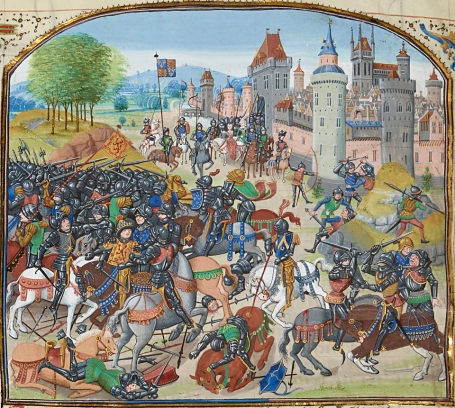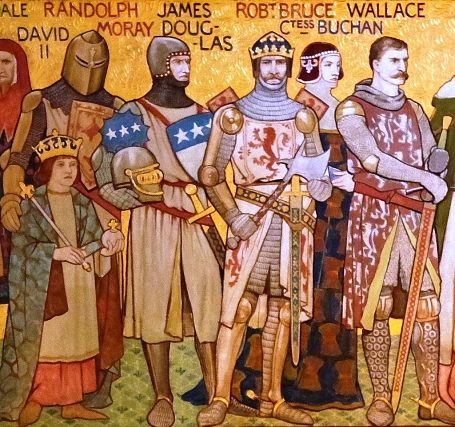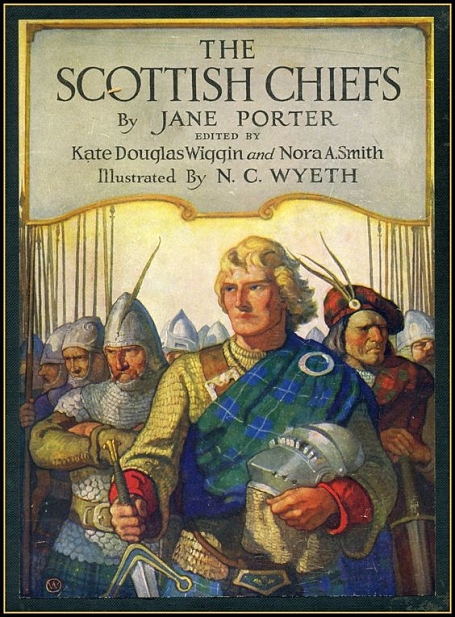The Life and Heroick Actions of the Renoun'd Sir William Wallace,
General and Governour of Scotland
by William Hamilton of Gilbertfield
Book XII, Chapter III (Continued)
How WALLACE killed the Lyon.
The King perceiving Wallace in a Fire,
Meekly reply'd, "It was your own Desire.
Else by the Faith of a most Christian King,
I never would allow of such a Thing.
For Men of Honour ask'd it in your Name,
So you or they are only for to blame.
Wallace reply'd, "I vow to the great God,
This seems to me a Thing both Strange and Odd.
By all that's Good, no higher can be sworn,
I know no more on't, than the Child unborn.
Of Honour sure I have a better Taste,
Than to be proud to fight a savage Beast.
This is a Trick devis'd by some of those,
Who are my secret and Malicious Foes."
The King conceiving there was Falshood wrought,
Caus'd both the Squires quickly to be brought:
Who when they came, the Crime could not deny:
But plainly did confess the Treachery.
For which, and other must ungodly Deeds,
The King commanded to strike off their Heads.
Thus came the Squires to their fatal End,
As did the Champions, to all Men be't kend.
The Champions first, for their Disdain and Flout
At Scotland, justly got their Brains beat out.
The Squires next, for Malice and Envy,
Did lose their Heads and most deservedly,
For our Instruction then, we may reflect.
Nothing from Justice Villains can protect.
Each Rogue, altho' with Nick he should combine,
Shall be discov'red either soon or syne.
And may be certain of a Rogue's Reward,
Vertue and Honour who does not Regard,
As in the sacred Scriptures we may read,
But to my Purpose further I proceed.
When Wallace saw the Court envy'd him so,
To Scotland then he purposed to go:
To aid his Country, and to take his Chance,
Despising all the Wealth he had in France.
Once more his Native Land for to relieve,
Which South'ron Foes did now afflict and grieve.
And to its pristine Freedom it restore,
Or else he vow'd that he should dy therefore.
The King perceiving Wallace that Way bent,
Gave him the Letter that was lately sent
From the Scots Lords, which he read and perus'd,
Then told the King he must have him excus'd.
For he in France no longer could remain,
But must return to Scotland back again.
Since that his Country was distressed so,
Being invaded by the South'ron Foe.
But to abridge my Story and be short,
Wallace takes leave of King and all the Court.
At which the King did sorrowful appear,
And to the Chamber quickly did retire.
Jewels and Gold he gave him in that Hour,
For to support his Honour and Grandeur.
But Lords and Ladies did lament and grieve,
And weeped sore when Wallace took his Leave,
No Man he took with him of Note, or Might,
To Scotland back, but Longoveil the Knight,
Who loved Wallace with so true a Heart,
What e'er befel, would never from him part.
Towards the Sluce in goodly Order past,
A Vessel got and made to Sea at last.
Eight Seamen had, as good as were alive,
And then at Tay did safely all arrive.
The ballad, The Life and Heroick Actions of the Renoun'd Sir William Wallace, General and Governour of Scotland, by William Hamilton of Gilbertfield, 1722, is in the public domain.

The Kingdom of England and the Kingdom of Scotland fought dozens of battles with each other. They fought typically over land, particularly Berwick-Upon-Tweed, and the Anglo-Scottish border frequently changed as a result. Read more at Wikipedia.

The First War of Scottish Independence was the initial chapter of engagements in a series of warring periods between English and Scottish forces lasting from the invasion by England in 1296 ... Read more at Wikipedia.

Digitized version of The Scottish Chiefs, by Jane Porter, a novelization published in 1921 by Charles Scribner's Sons, about William Wallace and the First Scottish War of Independence. Read online at archive.org.